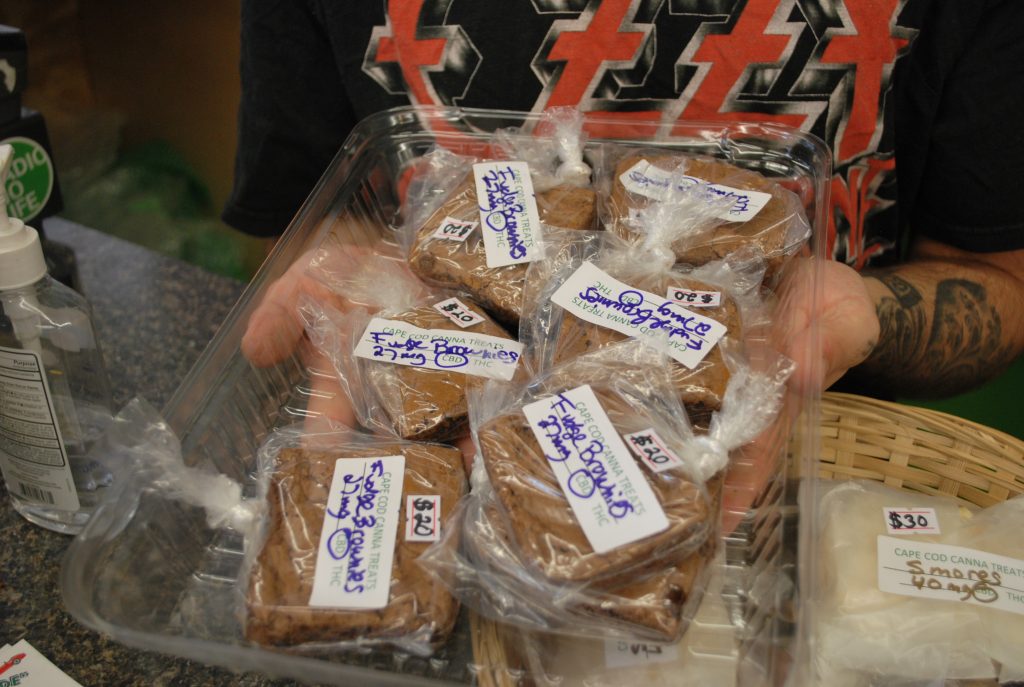At age 45, marijuana-grower Anscomb says it’s time for him to go legit.
He’s been illegally raising and harvesting weed for 13 years in an underground capacity (here’s a guide to how to grow your own), but now that recreational marijuana is legal, Anscomb is getting ready to apply for a cannabis cultivation license and get his business on the books.
Anscomb is a science teacher living in Northampton. He’s got a wife and children and even though marijuana is legal in the state, he’s wary of publicly admitting his connection — even without mentioning the 13 years of illegal growing. Anscomb says he’s not sure how his superiors would take it, and he could risk being fired.
Anscomb started growing marijuana, in part, to help his wife who has a rare autoimmune disease, hereditary angioedema, that causes uncomfortable swelling in the hands, feet, face, and airways. It often comes with excruciating abdominal pain, as well. Anscomb grows marijuana strains high in CBD, a marijuana chemical that doesn’t get you high, but has anti-inflammatory and relaxation benefits.
The medical bills in Anscomb’s home total between $30,000 and $70,000 per month, he says, though much of it is covered by health insurance. Finding physical and financial relief with marijuana about 10 years ago has helped the family. Anscomb says he’s glad with the passage of recreational marijuana in November 2016 that it’s safer for him to grow pot, event moreso than when medical marijuana was legalized in 2012.
“It helps with her attacks and I’ve been specifically trying to breed strains that were helpful to her and now I feel a lot less nervous about doing that,” Anscomb says. “And I find that even though medicinal dispensaries that are out now are great, they still don’t produce the same level and quality that I expect that they should be able to.”
So, he’s got the experience to grow; now he just needs the government’s okay to go public.
“One of the things I’d like to do is breed medicinal strains even though it’s recreational,” he says.
But he’s worried, as a small businessman, he won’t have a fair shot at joining the marijuana economy because smaller growers don’t have the deep pockets of mega wealthy corporations. It might be more difficult for smaller business to pass the state’s safety requirements.
“I feel like that the way they’re rolling out the medicinal laws in Massachusetts is unfair for small growers,” he says. “Right now, they’re basically favoring large corporations.”
Anscomb is one of many people in Western Massachusetts planning to join the vanguard of professional marijuana business. Owners at Mary Jane Makes Your Heart Sing and Hashbury Headshop, both of Springfield, say they plan to apply for marijuana-related licenses.
‘In a holding pattern’
The road, of course, won’t be easy. Marijuana is a new industry and regulations around it are still being formed. In late-August, Massachusetts officials were still appointing members to the Cannabis Control Commission, the regulation generating and enforcement government body for marijuana, which is charged with reviewing and approving licenses and reviewing marijuana commerce.
“I hope that Massachusetts will provide a large number of those recreational licenses,” Anscomb said. “It’s in their best interest.”
Anscomb likens the recreational marijuana industry to craft brewing craze, which began 10 to 15 years ago and believes a variety of strains and smaller growers would allow consumers to have a lot of choices about what types and how much they’d pay for pot.
“Mass producing factories are going to produce that quality of cannabis that’s cheap, but not the best,” he said. “If you’re going to be looking for the very highest quality, that’s going to come out of the small farms with only a couple of people doing it.”
Recreational marijuana licenses will be awarded by the yet-to-be established five-member Cannabis Control Commission, which will be established by Sept. 1. The commission is required to accept completed applications by April 1, 2018, for retail, manufacturer, cultivator or testing facility licenses. Applications come with a $13,000-$18,000 application fee.
More than 29,000 people, which represent 57 percent of Springfield residents, voted to approve Question 4 legalizing recreational marijuana in November 2016. The only way that recreational marijuana businesses could be banned in the city is if it’s put to another referendum vote, according to state Sen. James Welch, (D-West Springfield).
Welch’s district covers Springfield and he is a member of the Joint Committee on Marijuana Policy. He said the Senate passed a bill amending the state’s recreational weed laws in June.
The amendment allows municipalities that had a majority approval on Question 4 to seek a referendum vote to decide whether marijuana businesses would be allowed in their communities, he said. City or town officials would decide whether or not to allow weed businesses for communities that voted against Question 4.
One of the most recent changes to recreational marijuana laws made by the Legislature sets the tax on marijuana at 20 percent, Welch said. The original marijuana tax rate approved by voters was 12 percent. The House of Representatives proposed a tax rate of 28 percent, while the Senate called for 12 to 13 percent.
“With local municipality taxes included, it ended up being around 20 percent,” he said. “I think that was a good compromise, of course. I think anything higher than that would have been too high. The last thing we want to do is make the price and the taxes too high. That would continue to encourage the black market.”
When asked if he believes Springfield could see economic gains from legalized pot, he replied that right now, people are concerned that marijuana was an illegal drug and that stigmas against it remain. At the same time, he sees that changing.
“I think there’s a lot of room and a lot of opportunity for communities that embrace the new industry to be able to profit from it,” he said. “I think as time moves on, people will become more familiar with the product and see what the benefits are from it and understand that adults who choose to use recreational marijuana use it in a very similar way to alcohol.”
Gov. Charlie Baker appointed state Sen. Jennifer Flanagan (D-Leominster) to the Cannabis Control Commission on Aug. 23, but there are still four more people who need to be appointed to the government body before it can begin resolving unanswered questions that many municipalities have about recreational weed regulations.
“We’re basically in a holding pattern,” said Philip Dromey, deputy director of planning for Springfield.
He said the city recently had a moratorium on recreational marijuana, which expired in August, but city officials decided not to re-instate it because businesses won’t be able to apply for recreational marijuana licenses until next year.
Sparking it early

Charles Christian III, part-owner and manager of Mary Jane Makes Your Heart Sing in Springfield, holds a bar of CBD infused chocolate. Photo by Chris Goudreau
Not everyone waited around for Massachusetts to get its act together before jumping into the weed business. Charles Christian III, 35, is a part-owner and manager of Mary Jane Makes Your Heart Sing in Springfield. The small 1865 Page Boulevard smoke shop, located adjacent to a tropical fish store, is a family owned business with his father, Charles Christian Jr. and mother Selina Christian, also part-owners. Around March, Mary Jane Makes Your Heart Sing generated controversy in the city for charging a $50 admission fee to the shop. Each fee came with a free gift of an eighth of marijuana. Mayor Domenic Sarno and members of the City Council weren’t buying the idea of a free gift attached to an admission fee to circumnavigate recreational weed laws and the city issued a cease and desist order on March 1. The store temporarily closed before re-opening on April 4.
“The state asked us to stop until the licenses were available, pretty much due to them being able to tax it and regulate it; to make sure it’s safe, which we complied to,” Christian says. “We came back with a different business model with all the essentials and planning on doing grow courses and moving the cannabis community forward.”
Christian says he isn’t worried about Mary Jane getting denied a license due to the marijuana gift controversy.
“Nothing negative has happened from that because we’ve been compliant and handling the business accordingly,” Christian said. “Hopefully, we’ll be able to do that nice and easy.”
Christian says, if all goes well with the state, he has plans to expand his business.
“We might have a different location for the recreational dispensary,” Christian said. “We’ll remain a smoke shop in this location … We’d like to have cannabis tours, grow classes, cooking courses. We’re also looking into possibly having a shop in the MGM casino once that’s available.”
Christian says he hasn’t met with anyone at MGM and the casino hasn’t mentioned a desire to sell in-house marijuana, but who knows where a conversation with the gambling giant could lead.
Just three and a half miles down the road from Mary Jane Makes Your Heart Sing is Hashbury Headshop — a marijuana-geared smoke shop next to a pizza joint that celebrates 1960s and 1970s hippie and rock culture just as much as cannabis. Images of famous rockers such as the Grateful Dead adorn the shop’s walls next to shelves of bongs, pipes, and cannabidiol brownies.
Frank Cincotta, 26, a lifelong Springfield resident and owner of Hashbury Headshop, opened up the shop on Oct. 1, 2015, after saving for two to three years while working a minimum wage job. He’s worked as a bus boy, donned a chicken suit and waved signs, and had a job at the U.S. Census Bureau.

Hashbury Headshop owner Frank Cincotta shows off the shop’s collection of bongs. Photo by Chris Goudreau
“I worked up every minimum wage job there was and saved up money until I got to this point,” he says. “I’ve just been a big pothead for over a decade and it just morphed into this. It’s kind of the natural course of action, I guess.”
Cincotta says he wants everything from lip balms to marijuana infused drinks, and different strains of pot in his store if he’s able to obtain a retail license.
“Half the store is going to be cannabis products as opposed to cannabis accessories,” he says.
If Hashbury Headshop is able to receive a retail license, Cincotta thinks the store will have a lot of customers that are not just coming from out of state, but from nearby communities that have decided to ban recreational marijuana businesses such as Wilbraham, which banned pot shops during a May 2017 Town Meeting vote.
“Wilbraham voted ‘No’ on pot shops. We’re going to get everyone from Wilbraham right over here,” he says. “Yeah, I’m looking forward to that.”
Getting green for green
Although marijuana is legal in Massachusetts, it’s still an illegal controlled substance as far as the federal government is concerned. This means the burgeoning Massachusetts marijuana industry faces issues working with banks, many of which won’t allow marijuana-related businesses to open a checking or savings account. And it’s hard to have a business without a bank to support it.
It’s not exactly clear what the risks banks could be if officials decided to offer services to marijuana-related industries. This is new ground for the federal government, too, but repercussions could be anything from steep fines to losing protection under the FDIC and consumers’ trust, says Jon Skarin, executive vice president of the Massachusetts Bankers Association.
“There’s substantial risk to it,” he says. “No bank wants to run afoul of the regulators; they don’t want to run into any legal issues; and they certainly don’t want potential reputational risks down the road if they are taken to court.”
Christian said his family’s shop hasn’t worked with a bank yet, but they’re looking at their options.
“Hopefully that won’t become an issue once we have the recreational dispensary because we are looking at a couple banks that are okay with working with [marijuana] companies,” he says.
When starting his business, Cincotta didn’t consider getting a loan from a bank; he figured the marijuana relationship would torpedo his chances. It’s not just banks that have concerns about weed businesses, credit card companies also distance themselves from the industry.
“We have an ATM with cash-only here at the store,” Cincotta says. “Because we claim that we’re cannabis and most stores claim tobacco, so that’s how they’re able to get under the radar with the credit card readers and still maintain business relationships with them. We’ve gone through five different card companies and they all denied us after like a month.”
Century Bank is the only bank in Massachusetts to do business with medical marijuana dispensaries, Jim Borghesani, communications director for ‘Yes on 4,’ a lobbying campaign for recreational marijuana in Massachusetts, says.
“It comes at a very high cost; It’s very expensive to even have a checking account with these facilities. Recreational marijuana facilities will face the same problem unless more banks begin offering services to the industry,” Borghesani says.
Skarin said the Massachusetts Bankers Association hasn’t taken a position on whether banks should do business with weed.
“We’re not advocating one way or another for or against medicinal or recreational marijuana. That’s kind of an individual decision, but if states are going to legalize marijuana it’s better to have those businesses in the financial system than being an all-cash business,” he says. “You have better oversight on where the funds are going if they’re in a bank than if they’re in a duffle bag full of cash in somebody’s house.”
Anscomb, who’s seeking to go from underground to public marijuana growing, wants to continue cultivation on a small scale in the hopes that he won’t need the banks and will see as little government interaction as possible.
“I’m going to do all of the investing myself and with close friends and family members,” he says. “Everyone who has lots of money is very wary of what the federal government’s approach is going to be. As long as we stay small, I believe we’ll be off their radar. If they come after people, they’re going to come after the largest growers first.”
Contact Chris Goudreau at cgoudreau@valleyadvocate.com.















